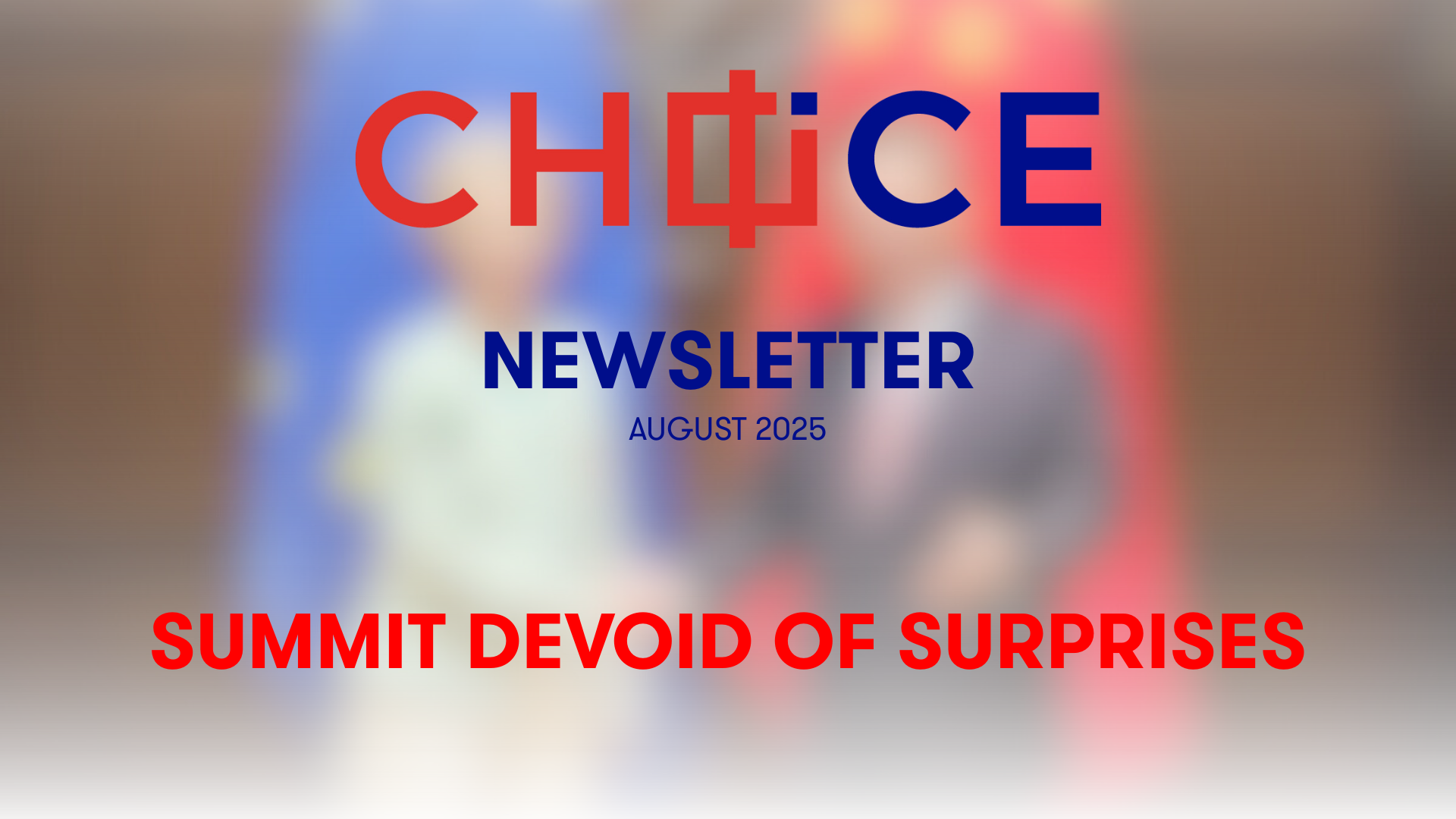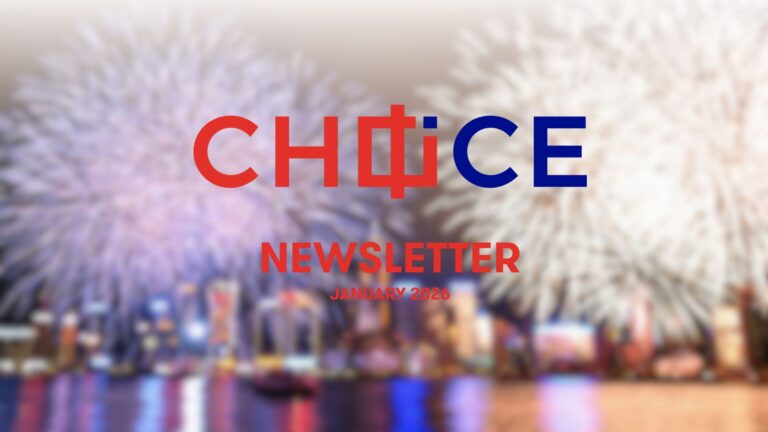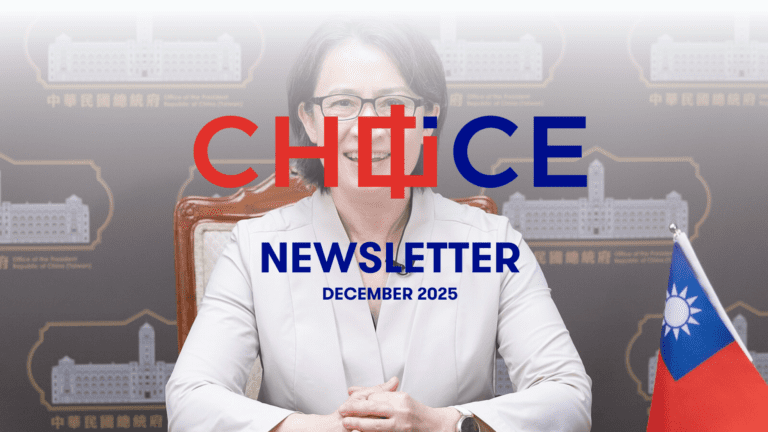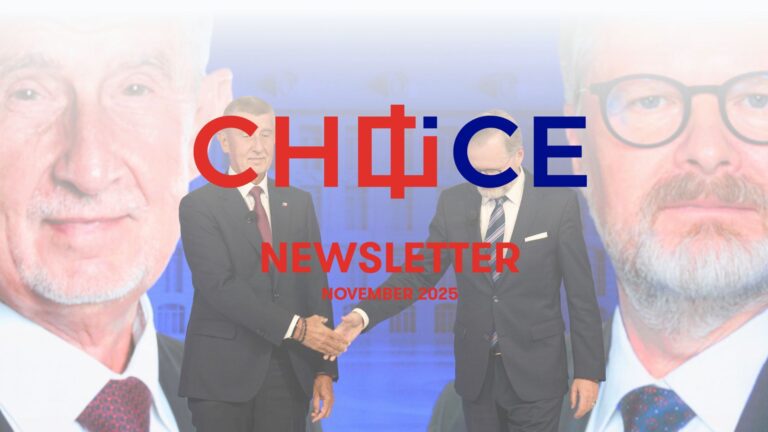CHOICE Newsletter: Summit Devoid of Surprises

Dear reader,
welcome to the August issue of the CHOICE monthly newsletter! As some parts of Europe bake under another hot summer, while other get soaked by rain, our team has scattered across the continent – but with a noticeable pattern. Most of us have chosen higher ground in the Alps or found refuge along the breezy Baltic seashore. (Did you know that with climate change, the Baltic states may soon become the new Mediterranean – ideal for beach holidays and still far less crowded?)
Despite the seasonal slowdown, we’re keeping a close watch on the major developments in Europe-China relations. In this month’s CHOICE Take, we reflect on the outcomes of the July 24 EU–China summit in Beijing, offering a distinctly CEE lens on what may be dubbed another meeting of the deaf. Meanwhile, in Taiwan Focus, we revisit the story of the Great Recall – an ambitious effort to unseat 24 KMT lawmakers and what it reveals about the island’s political climate.
As always, thank you for reading – and we hope you’re staying cool and dry, wherever summer finds you.
CHOICE Take
Europe’s increasingly precarious position – highlighted by the lackluster 25th EU-China summit held in Beijing on July 24, 2025, and reinforced by the EU’s acceptance of a mercantilist trade agreement with the United States – evokes the structure of an old geopolitical order: one where great powers extract economic and strategic concessions from those caught in between. In this updated version of the tributary system, the EU finds itself navigating between two centers: one pressing for loyalty through market access and security guarantees, the other leveraging economic dependencies.
Paradoxically, it is China that now advocates for predictability and long-term stability in international market. Yet this liberal rhetoric is instrumental – designed to project soft power, preserve favorable trade conditions, and expand influence, all while advancing a state-centered, security-first development model at home. Having weathered economic confrontation with the US, Beijing has emerged emboldened – less inclined to accommodate European concerns and more assertive in defining the terms of engagement. This new posture was on full display during the strategic dialogue between Wang Yi and Kaja Kallas, as well as in the final outcomes of the summit, where Chinese officials remained defiant on key European concerns.
China’s confidence is further reinforced by its perception of a fragmented Europe “caught in contradictory and entangled dilemmas” and sending “inconsistent signals.” While Brussels voices alarm over China’s industrial overcapacity resulting in trade imbalance, the data tell a different story. In May 2025 alone, Chinese exports to Central and Eastern Europe (CEE) surged: by 80% to Estonia, 40% to Hungary and Bulgaria, and nearly 40% to Latvia. From Beijing’s perspective, the EU’s “de-risking” rhetoric has so far failed to translate into a meaningful action.
The geopolitical split within Europe reinforces this impression. Poland and the Baltic states condemn China’s support of Russia in its war of aggression in Ukraine, placing it within an authoritarian bloc; while Hungary, in contrast, deepened bilateral ties following the EU-China summit. Even Lithuania, among Beijing’s sharpest critics, enhances cooperation with authoritarian Vietnam, raising awkward questions about its normative consistency. To Beijing, this divergence validates its stance: that Europe’s “challenges” stem from internal factors and are not caused by China.
The EU now risks being squeezed between two rivals, both of which seem increasingly confident that Europe lacks the unity or leverage to shape outcomes. The logical question then is: where can European strength come from?
Here, CEE countries may chip in. Most remain aligned with the US and are skeptical of China’s strategic intentions. At the same time, they recognize that a passive wait-and-see approach to the unfolding US-China competition would be disastrous, and, instead, are beginning to build capabilities from within. Lithuania, a leader in ultrafast lasers, is becoming critical in South Korea’s semiconductor and clean energy ecosystems, while Estonia sets global standards in digital governance and cybersecurity, co-developing maritime and trust frameworks with Singapore.
Analysts often point to Europe’s major powers, especially Germany and France, which should drive the „de-risking“ agenda. Diversifying supply chains – particularly in rare earths – is vital, yet such strategies seem likely to falter without a pan-European posture that leverages the very strengths demonstrated by smaller member states.
Europe’s renewed strength and confidence will not be forged in Paris and Berlin alone. It must emerge from a coalition of capabilities, uniting diverse members around shared strategic goals. Paradoxically, this is what China professes to admire in Europe: unity in diversity. But that unity must move beyond rhetoric into coherent action. To avoid becoming a passive observer in a contest it cannot control, Europe must redefine its role and act not as a tributary, but as a strategic actor. Central and Eastern European countries, in turn, should actively contribute to shaping that role.
By Elzė Pinelytė, CHOICE Analyst (based in Lithuania)
Taiwan in Focus
Are Taiwanese signaling frustration with the current two-party political deadlock?
Taiwan just experienced an unprecedented use of its parliamentary recall elections system: 24 members of the opposition KMT party were challenged yet none of them was dislodged. The move was triggered mostly by the ruling DPP party that lacks a majority in the parliament. The situation has led to budget cuts, and a paralysis of certain branches of government. But beyond a defeat for the DPP, what else are Taiwanese signaling?
Some attribute the results to the success of Beijing-orchestrated propaganda which is undoubtedly present on social media and through pro-Beijing media, particularly on TV stations.
But the results could also indicate a general fatigue with the KMT-DPP fight as none of those two parties are able to solve two main crises affecting primarily younger Taiwanese: low salaries and unaffordable housing in a country where over 80% of the population lives in urban settings. While the cost of living in Taiwan is similar to the one in Japan, average salaries are almost half of what is offered in Japan. Overall, Taiwanese people are growing more concerned about the polarization that is dividing their society, breaking families and threatening trust in democratic mechanisms.
Failure to address youth issues partially explains why the Taiwan’s People’s Party (TPP) was able to attract disillusioned youth. By aligning itself with the KMT in Parliament, the TPP has indeed enabled the main opposition party to paralyze the DPP on a number of key issues. Today the DPP is paying the hard price for neglecting the welfare of younger generations. It needs to urgently deliver if it wants to maintain power in the 2028 election, given that recent elections indicate a high turn-out of young voters in Taiwan.
By Filip Noubel, CHOICE Analyst (based in Taipei)
WiCH Highlights
🇲🇰 Ana Krstinovska, a WiCH Co-Chair for North Macedonia, has recently hosted a first-ever regional conference on China for parliamentarians from the Western Balkans in Belgrade. Check it out here!
🇨🇿 Ivana Karásková, a WiCH Co-Chair for Czechia, spoke at the Atlantic Council’s Global China Hub discussion about the EU-China Summit. Watch the recorded debate here!
🇧🇪 Abigaël Vasselier, a WiCH Co-Chair for Belgium, has talked about her expectations of the EU-China Summit in a MERICS podcast episode. Listen here!
CHOICE News
 The EU-China Summit has been a topic for the media, too. CHOICE Founder and Lead, Ivana Karásková, commented for various media outlets, including national Czech TV (read it here), national Czech Radio live, the Slovak news portal SME (read it here), and an economic portal Hospodářské noviny (check it out here).
The EU-China Summit has been a topic for the media, too. CHOICE Founder and Lead, Ivana Karásková, commented for various media outlets, including national Czech TV (read it here), national Czech Radio live, the Slovak news portal SME (read it here), and an economic portal Hospodářské noviny (check it out here).
 Our Analyst Filip Noubel spoke about the Dalailama’s 90th birthday and the future of Tibet for Slovak Hospodarske noviny (read it here).
Our Analyst Filip Noubel spoke about the Dalailama’s 90th birthday and the future of Tibet for Slovak Hospodarske noviny (read it here).
 Dominika Remžová’s CHOICE article about her latest MapInfluenCE paper on the local impact of Chinese EV investments in Slovakia was featured in the Asia Daily newsletter by The Asia Cable (check it out).
Dominika Remžová’s CHOICE article about her latest MapInfluenCE paper on the local impact of Chinese EV investments in Slovakia was featured in the Asia Daily newsletter by The Asia Cable (check it out).
 We’re on Bluesky! Stay updated with our latest articles, insights, and news by following our account – don’t miss out on valuable content and updates. (follow us here)
We’re on Bluesky! Stay updated with our latest articles, insights, and news by following our account – don’t miss out on valuable content and updates. (follow us here)
Written by
CHOICE
CHOICE is a multinational consortium of experts providing informed analysis on the rising influence of the People’s Republic of China within the countries of Central and Eastern Europe (CEE).


